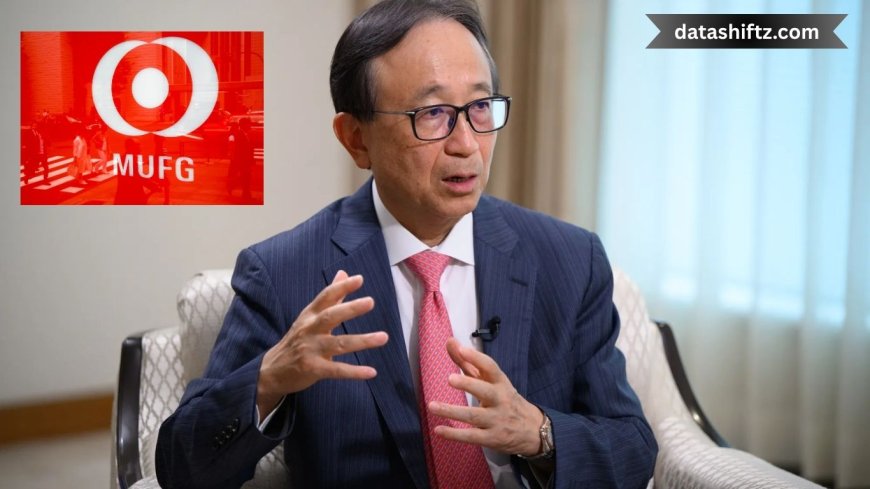MUFG CEO Urges Bank of Japan to Hike Rates Sooner Amid Rising Inflation

Inflation has become a global concern as economies rebound from the pandemic. In Japan, where inflation has historically been subdued, the recent rise in consumer prices has prompted calls for changes in monetary policy. Takashi Kunibe, the Chief Executive Officer of Mitsubishi UFJ Financial Group (MUFG), Japan’s largest bank, has voiced a strong opinion: the Bank of Japan (BOJ) should consider hiking interest rates sooner than expected to combat inflation effectively.
The Context: Japan’s Inflation and Monetary Policy Landscape
For decades, Japan has struggled with deflationary pressures and stagnant economic growth. The Bank of Japan has maintained ultra-loose monetary policy, including negative interest rates and massive asset purchases, to stimulate the economy. This approach has kept borrowing costs low, encouraged spending, and supported financial markets.
However, the global surge in inflation due to supply chain disruptions, energy price spikes, and increased consumer demand is now affecting Japan. While Japan’s inflation rate remains relatively moderate compared to other advanced economies, it has breached the BOJ’s 2% target, signaling a shift in the economic environment.
Why MUFG’s CEO Urges an Earlier Rate Hike
Takashi Kunibe argues that the BOJ needs to act proactively. His key points include:
-
Rising Inflation Pressure: Inflation, although moderate, is persistent and could become entrenched if left unchecked.
-
Global Monetary Trends: Other central banks, including the Federal Reserve and the European Central Bank, have started raising rates, which affects capital flows and exchange rates impacting Japan.
-
Financial Stability: Prolonged ultra-low rates may fuel asset bubbles and increase financial system vulnerabilities.
-
Currency Implications: A delayed rate hike could weaken the Japanese yen further, increasing import costs and inflation.
Comparison of Central Bank Interest Rate Trends (2022-2025 Projected)
| Central Bank | 2022 Rate (%) | 2023 Rate (%) | 2024 Rate (%) | 2025 Projected Rate (%) |
|---|---|---|---|---|
| Bank of Japan (BOJ) | -0.10 | -0.10 | 0.00 | 0.25 |
| Federal Reserve (Fed) | 0.25 - 0.50 | 4.50 - 4.75 | 5.00 - 5.25 | 4.75 - 5.00 |
| European Central Bank (ECB) | 0.00 | 3.50 | 3.75 | 3.75 |
| Bank of England (BoE) | 0.75 | 4.25 | 4.00 | 3.75 |
Potential Risks and Benefits of an Earlier Rate Hike
The call for an earlier interest rate hike is not without controversy. While MUFG’s CEO highlights several benefits, the decision involves balancing risks.
Benefits:
-
Containing Inflation: Raising rates helps curb excessive spending and borrowing, easing inflationary pressures.
-
Strengthening Currency: Higher interest rates can support the yen, reducing import costs.
-
Financial Market Stability: Preventing asset bubbles and speculative excesses by signaling a shift to tighter policy.
-
Aligning with Global Trends: Avoiding capital outflows and maintaining investor confidence.
Risks:
-
Economic Growth Impact: Higher rates may slow down domestic consumption and business investment, risking stagnation.
-
Debt Servicing Costs: Corporations and government entities with high debt levels may face increased costs.
-
Market Volatility: Sudden policy shifts could unsettle financial markets, leading to short-term instability.
Why Timing Matters for the Bank of Japan
The BOJ’s monetary policy decisions carry significant weight for Japan’s economy and global financial markets. Timing the first rate hike carefully is critical to achieving multiple objectives:
-
Inflation Control Without Stifling Growth: Early enough to prevent inflation from becoming entrenched, but cautious enough not to derail economic recovery.
-
Maintaining Credibility: Communicating clear intentions to markets can reduce uncertainty and speculative behavior.
-
Managing Currency Volatility: Coordinated timing with other central banks can help stabilize the yen and global markets.
Summary:
-
Japan’s inflation has breached the BOJ’s target, signaling a potential policy shift.
-
MUFG CEO Takashi Kunibe advocates for an earlier rate hike to manage inflation and financial stability.
-
Global central banks are increasing rates, which influences Japan’s monetary environment.
-
An earlier rate hike offers benefits but also carries risks related to growth and market volatility.
-
The timing of the rate hike is crucial for balancing inflation control, economic stability, and market confidence.
What to Watch in Japan’s Monetary Policy Moving Forward
-
BOJ Policy Meetings: Upcoming meetings will signal if and when rate hikes might occur.
-
Inflation Data Releases: Consumer price index (CPI) trends will be critical to assess inflation persistence.
-
Global Economic Conditions: International developments, including energy prices and supply chains, will impact Japan’s inflation outlook.
-
Currency Movements: The yen’s strength or weakness will influence import costs and inflation.
-
Financial Market Reactions: How investors respond to BOJ communications and actions will affect market stability.
Conclusion
Takashi Kunibe’s call for an earlier Bank of Japan rate hike underscores the evolving challenges of inflation in a historically low-inflation economy. While Japan’s approach has prioritized economic stimulus for many years, the global inflationary environment demands careful reconsideration. Balancing the risks and benefits of tightening monetary policy will be essential for sustaining Japan’s economic health and financial stability.





























